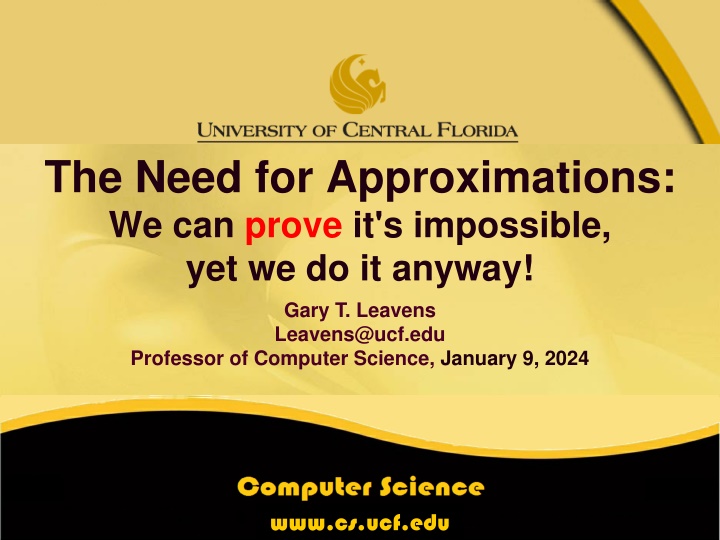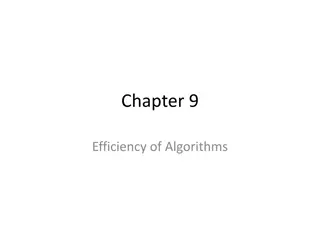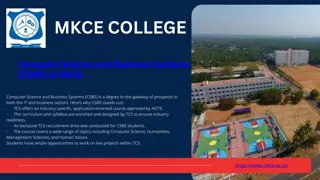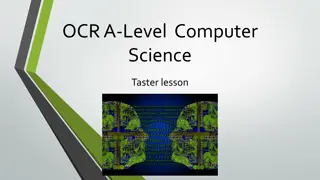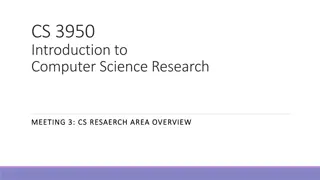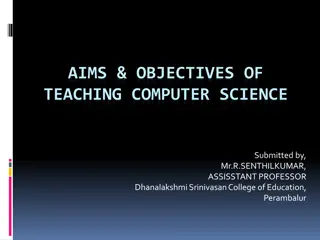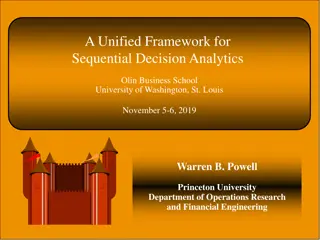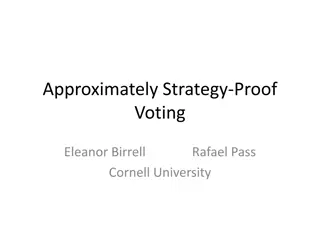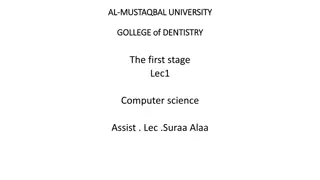The Need for Approximations in Computer Science
Exploring the concept of approximations in computer science, despite the inherent challenges in proving them, as discussed by Professor Gary T. Leavens. The content covers the background of problems and algorithms, defining effective procedures through examples and intriguing programs. Delve into the capabilities and limitations of programs, questioning whether they can solve all problems, leading to a discussion on the impossibilities faced by computers.
Uploaded on Sep 21, 2024 | 2 Views
Download Presentation

Please find below an Image/Link to download the presentation.
The content on the website is provided AS IS for your information and personal use only. It may not be sold, licensed, or shared on other websites without obtaining consent from the author.If you encounter any issues during the download, it is possible that the publisher has removed the file from their server.
You are allowed to download the files provided on this website for personal or commercial use, subject to the condition that they are used lawfully. All files are the property of their respective owners.
The content on the website is provided AS IS for your information and personal use only. It may not be sold, licensed, or shared on other websites without obtaining consent from the author.
E N D
Presentation Transcript
The Need for Approximations: We can prove it's impossible, yet we do it anyway! Gary T. Leavens Leavens@ucf.edu Professor of Computer Science, January 9, 2024 www.cs.ucf.edu
Background: Problems A problemis a specification of a procedure s desired relation between inputs and outputs (possibly with some resource constraints) E.g., Given two positive integers n and m, produce the remainder, r, of n divided by m, i.e., such that 0 r and there is some integer k such that k m+r = n. www.cs.ucf.edu
Background: Algorithms Inputs: integers n, m. Assume n 0 and m > 0. 1. If n < m, then halt, returning n. 2. if n m, then set n to be n-m and go to step 1. www.cs.ucf.edu
Effective Procedure a set of rules which tell us, from moment to moment, precisely how to behave. -- M. Minsky, Computation: Finite and Infinite Machines (p. 106) Practical definition: a program written in a computer programming language that always gives an answer www.cs.ucf.edu
Example Program define Rem(n, m) = if n < m then return n else return Rem(n-m, m) www.cs.ucf.edu
An Interesting Program define H(x) = if odd(x) thenreturn ((3*x)+1)/2 elsereturn x/2; define Steps(n) = if n == 1 thenreturn 0 elsereturn 1+Steps(H(n)) E.g., Steps(1) == 0 Steps(2) == 1 Steps(3) == 5 note: H(3)=5, H(5)=8, H(8)=4, H(4)=2, H(2)=1 Steps(7) == 11 Steps(27) == 70 www.cs.ucf.edu
Can Programs do Everything? Program = effective procedure, note: must always give an answer But if Some problems can t be solved by programs! Then: all problems what programs can do www.cs.ucf.edu
Impossibility, What Computers Can t Do www.cs.ucf.edu
The Halting Problem Write a program, Halts(P,I), that takes a program P, and input string I, and: Halts(P, I) = true, if P halts on input I, Halts(P, I) = false, if P does not halt on input I, Halts always returns true or false in a finite amount of time. www.cs.ucf.edu
We care if programs halt define H(x) = if odd(x) thenreturn ((3*x)+1)/2 elsereturn x/2; define Steps(n) = if n == 1 thenreturn 1 elsereturn 1+Steps(H(n)) A student may say: I tried Steps(703), and it seems to run for a long time, does it stop? So, this is a practical, important problem. www.cs.ucf.edu
Work of Alan Turing (1936) Turing was a quite brilliant mathematician, most famous for his work on breaking the German Enigma codes. It is no exaggeration to say that, without his outstanding contribution, the history of World War Two could well have been very different. -- Gordon Brown s statement Sept 10, 2009 www.cs.ucf.edu
Solving the Halting Problem is Impossible! Proof by contradiction: Suppose Stops solves the halting problem. Let T be as in the program below: define loop() = return loop(); % loops forever! define T(P) = if Stops(P,P) thenreturn loop() elsereturn false end Consider T(T) By definition, T must either loop forever or return false. If it returns false, If it loops forever, www.cs.ucf.edu
Solving the Halting Problem is Impossible! Proof by contradiction: Suppose Stops solves the halting problem. Let T be as in the program below: define loop() = return loop(); % loops forever! define T(P) = if Stops(P,P) thenreturn loop() elsereturn false end Consider T(T) By definition, T must either loop forever or return false. If it returns false, then Stops said T wouldn t halt on input T, but it did halt! If it loops forever www.cs.ucf.edu
Solving the Halting Problem is Impossible! Proof by contradiction: Suppose Stops solves the halting problem. Let T be as in the program below: define loop() = return loop(); % loops forever! define T(P) = if Stops(P,P) thenreturn loop() elsereturn false end Consider T(T) By definition, T must either loop forever or return false. If it returns false, then Stops said T wouldn t halt on input T, but it did halt! If it loops forever, then Stops said T must have halted on input T, but it didn t (since it is looping forever)! www.cs.ucf.edu
Other Unsolvable Problems Write AlwaysHalts(P) to decide if P halts on all inputs Unsolvable, since it includes the halting problem as a special case! Write HaltsOnEmpty(P) to decide if P halts on as input Unsolvable, since can construct from HaltsOnEmtpy a procedure Stops that would solve the halting problem! define Stops(P,I) = define N(E) = return P(I); % ignore E and run P on I return HaltsOnEmpty(N) www.cs.ucf.edu
Rices Theorem There is no program that can decide any non-trivial property of programs. www.cs.ucf.edu
Can Programs Help Programmers? www.cs.ucf.edu
What wed like to Decide About a Program Could the program encounter any type errors? Could the program ever crash? Will the program produce the correct output? Are these impossible? Yes, programs can t decide these precisely, must change the problem! www.cs.ucf.edu
Changing the Problem: What should this (web) program do? from umbrellatoday.com, by permission www.cs.ucf.edu
What Should umbrellatoday.com do? Need Umbrella? It rains No rain Good OK YES Bad Good NO Safety (conservatism) means: when in doubt say bring umbrella ! www.cs.ucf.edu
Example: Type Checking A type error is an attempt to apply an operation to arguments that are not appropriate e.g., 3 + 4 % ok true + 4% type error! Problematic cases: if read() then return 3 + 4 else return true + 4 end define A(I) = return I + 4; define B() = return A(true); www.cs.ucf.edu
Specifications for Type Checking What it says Has Error in Run No Error in Run Good OK type error Bad Good no error Safety (conservatism) means: when in doubt say type error ! www.cs.ucf.edu
Sound, Conservative Type Checking If tool says: type error , then might be a type error at runtime no errors , then won t be any errors at runtime Soundnessmeans no errors is valid Examples of where sound checker says type error : if read() then return 3 + 4 else return true + 4 end define A(I) = return I + 4; define B() = return A(true); www.cs.ucf.edu
Some Rules for Conservative Type Checking if E1 then E2 else E3 end : T if E1: bool, E2: T, and E3: T P(E): T if P: (S) -> T and E: S P(x) = E remember P: (S) -> T if assuming x: S then E: T true: bool false: bool 0: int, 1:int, 2:int, x: T if we are remembering x:T E1opE2:T if E1: S1, E2: S2, and op: (S1,S2) -> T www.cs.ucf.edu
What a Sound Checker Does Programs Checker says no errors Programs without runtime type errors Undecidable boundary Checker says type error Programs with runtime type errors www.cs.ucf.edu
Sound but Not Very Useful Programs Checker says no errors Programs without runtime type errors Undecidable boundary Checker says type error Programs with runtime type errors www.cs.ucf.edu
Apparently more Useful, But Unsound Programs Checker says no errors Programs without runtime type errors Undecidable boundary Checker says type error Programs with runtime type errors www.cs.ucf.edu
Making better checkers Work Without End! Programs Checker says no errors Programs without runtime type errors Undecidable boundary Checker says type error Programs with runtime type errors www.cs.ucf.edu
Other Workarounds Accept I don t know , written , as an answer Approximate by combining knowledge: e.g., read() : if B then read()+4 else 5+7 end: www.cs.ucf.edu
What has been Accomplished (1) Standard compiler techniques Type checking before running program Static analysis: No aliases for this object? Variables read before written? www.cs.ucf.edu
What has been Accomplished (2) ASTR E static analyzer (CNRS, ENS, INRIA, France) Checks embedded flight control software Used on Airbus control programs Proves absence of certain runtime errors Undefined behavior (e.g., division by 0) Non-portable code Violation of assertions www.cs.ucf.edu
What has been Accomplished (3) Terminator (Byron Cook, et al., MSR, Cambridge) Proves program fragments (in C) terminate What can it answer? Used on Windows device drivers Iterative search for potential counterexamples to termination The counterexamples demonstrate loops! www.cs.ucf.edu
Conclusions Some tasks are impossible, i.e., undecidable Undecidable tasks give work without end! It is possible to partly automate these tasks Intellectually interesting work www.cs.ucf.edu
Impossible Problems give Unlimited Potential for Advances leavens@cs.ucf.edu www.cs.ucf.edu
